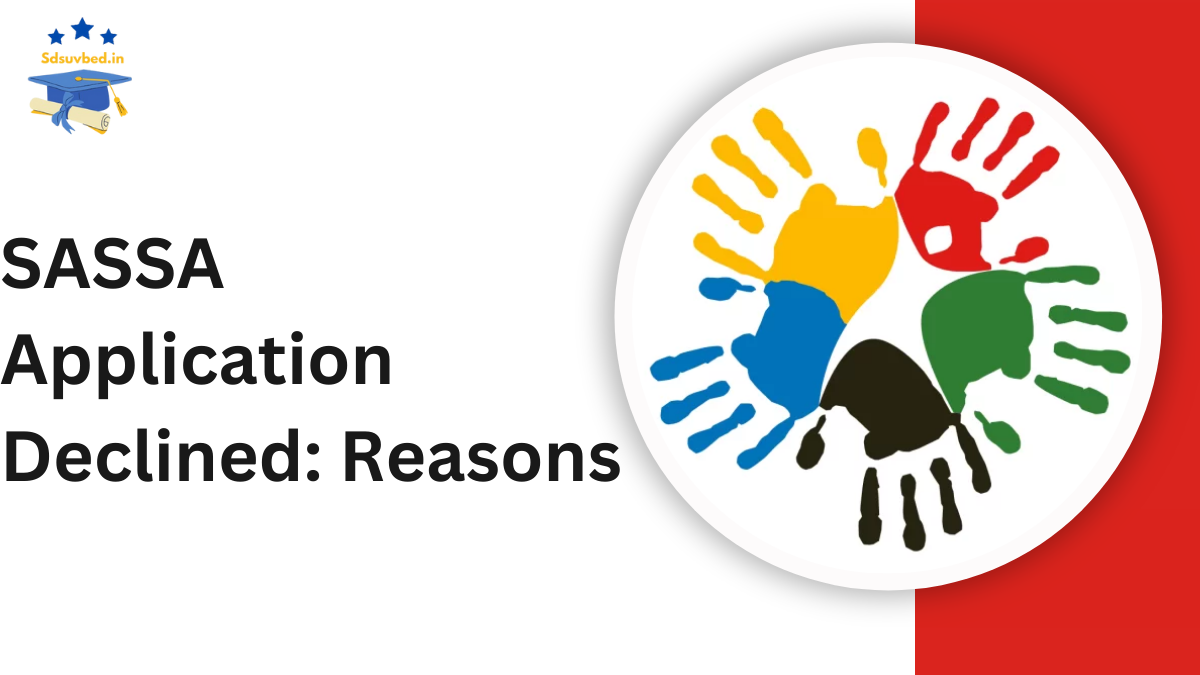Applying for a SASSA grant is often a lifeline for many South Africans. These grants provide vital financial support during challenging times, including old-age pensions, child support, and disability benefits. However, having your application declined can feel overwhelming. The good news is that a rejection doesn’t mean the end of the road. Understanding why your application was denied and knowing the steps to take afterward can significantly improve your chances of success.
This guide will help you navigate common rejection reasons, the appeal process, and alternative support options to ensure you get the assistance you need.

Understanding the Reasons for Grant Rejection
The South African Social Security Agency (SASSA) rejects applications for various reasons. Identifying why your application was declined is the first step toward addressing the issue and moving forward.
Common Reasons for Rejection:
- Incomplete Paperwork: Missing or incorrectly filled sections in your application form can result in automatic rejection.
- Incorrect Banking Details: Providing wrong or incomplete banking details prevents SASSA from verifying your account or disbursing funds.
- Identification Mismatches: Discrepancies between your details and those in the Department of Home Affairs database can lead to denial.
- Means Test Failure: If your income or assets exceed the qualifying threshold, your grant application will be rejected.
- Alternative Income Sources: Already receiving another grant or having additional income can disqualify you.
- Age Restrictions: Some grants, such as child support or unemployment assistance, have specific age limits.
- Fraud Concerns: Suspicion of fraudulent activity linked to your application can lead to rejection.
- Government Data Conflicts: Issues with other government departments, such as the Unemployment Insurance Fund (UIF), may also cause complications.
Understanding these reasons allows you to take corrective action before reapplying or appealing.
What to Do After Rejection
If your SASSA application is rejected, don’t lose hope. The appeal process provides an opportunity to have your application reconsidered.
Steps to Appeal Your SASSA Application:
- Log in to the SASSA Services Portal: Visit the official website (www.sassa.gov.za) and navigate to the appeals section.
- Enter Your Details: Provide your ID number and registered mobile phone number.
- Verify Your Identity: Enter the one-time PIN (OTP) sent to your phone.
- Select the Month: Choose the month for which your application was denied.
- Provide a Reason: Select a valid reason for your appeal from the provided list.
- Submit Your Appeal: Ensure all information is accurate before submitting.
Important:
- Appeals must be lodged within 30 days of receiving your rejection notice.
- The process may take up to 90 days, and you will be informed of the decision via SMS or email.
Important Considerations During the Appeal Process
To increase your chances of a successful appeal, keep the following points in mind:
Be Persistent:
You can appeal as many times as necessary if you believe the rejection was incorrect.
Check Your Documentation:
Ensure all submitted documents are accurate, up-to-date, and complete. Simple errors often lead to rejection.
Monitor Grant Payment Dates:
Stay informed about grant payment dates and timelines to plan your finances effectively.
Keep Track of Correspondence:
Maintain copies of all communication and documentation related to your application and appeal.
Common Mistakes to Avoid
Avoid these frequent mistakes to improve your chances of success:
- Missing Deadlines: Failing to submit your application or appeal on time forfeits your eligibility.
- Providing Incorrect Information: Double-check all details, including banking and identification, before submission.
- Not Meeting Eligibility Criteria: Ensure you qualify for the specific grant you’re applying for by reviewing the requirements.
Alternatives If Your Appeal Fails
If your appeal is unsuccessful, don’t give up. Consider these alternative sources of financial support:
Unemployment Insurance Fund (UIF):
If you recently lost your job, you may qualify for UIF benefits.
NGOs and Community Support Programs:
Many non-profit organizations provide essential services such as food packages, shelter, and other aid for those in need.
Local Government Assistance:
Contact your municipality to explore any temporary relief programs they may offer.
These options can provide temporary relief while you reassess your situation and explore further avenues of support.
FAQs
Why was my SASSA application declined?
Your application may have been declined due to incomplete paperwork, incorrect details, or failing the means test. Other reasons include age restrictions, fraud concerns, or conflicts with government data.
How long do I have to appeal my SASSA rejection?
You must appeal within 30 days of receiving your rejection notice.
What documents are required for a SASSA appeal?
Ensure you have accurate identification, updated banking details, and any additional documents required for your specific grant type.
How long does the appeal process take?
The appeal process can take up to 90 days.
What happens if my appeal is successful?
If your appeal is approved, you will receive payments for the months that were originally declined.
Can I reapply if my appeal fails?
Yes, you can reapply if your circumstances change or you resolve the issues that led to rejection.
What are some alternatives to SASSA grants?
Consider applying for UIF benefits, seeking help from NGOs, or exploring local government relief programs.
Who can I contact for help with my SASSA application?
You can reach out to SASSA via their toll-free number (0800 60 10 11), email (grantenquiries@sassa.gov.za), or by visiting their head office.
Click here to know more.
A passionate content writer specializing in creating engaging, SEO-optimized content. With expertise in blogs, web copy, and storytelling, I craft words that connect with audiences and deliver results.
